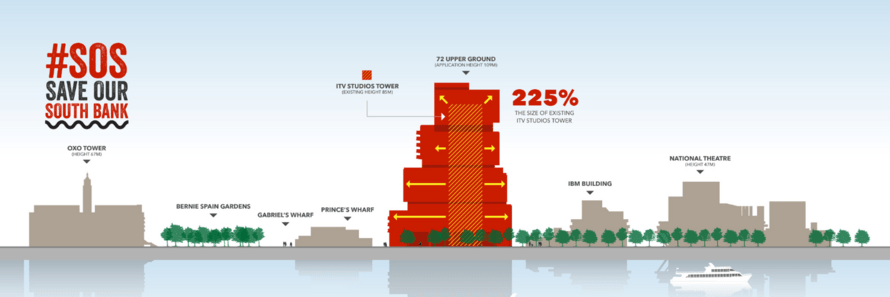What's on
From family support, fitness classes and learning to art exhibitions, festivals and talks, our activities are wide and far reaching.
From family support, fitness classes and learning to art exhibitions, festivals and talks, our activities are wide and far reaching.
Looking for hireable space? Your meeting, event, conference, exhibition, or filming, can help protect, build and galvanise our neighbourhood.
This is a neighbourhood like no other. Be part of it. Take a look at our current vacancies.
HIGH COURT UPHOLDS MICHAEL GOVE’S ‘SURPRISING’ DECISION TO APPROVE ‘UNATTRACTIVE’ DEVELOPMENT FOR THE SOUTH BANK
The High Court today dismissed a legal challenge to Michael Gove’s decision to approve two towers on the South Bank, known as ‘The Slab’, despite the former Secretary of State’s misgivings about its environmental impact and harm to the character of the South Bank, and other areas of national significance.
These misgivings were echoed by the judge in the High Court, Mr Justice Mould, who concluded in his decision, handed down today:
“It may seem surprising that [Mr Gove] should find that a scheme which would not deliver an attractive development of this very prominent and sensitive site on the South Bank should nevertheless be given planning permission. That, however, is a matter for [Mr Gove’s] judgement as the planning decision maker in this case.”
Mr Mould dismissed the High Court challenge from campaign group Save Our South Bank, following a long battle from when planning permission was submitted in 2021. The Save Our South Bank petition was signed by over 6,000 people and the crowd fund appeal for the campaign legal costs raised many thousands of pounds.
In May 2023, Mr Gove received an Inspector’s report recommending approval but did not take a decision for ten months. Mr Gove disagreed with the Inspector about the impact on major heritage assets in the capital, including harm to Grade I listed Somerset House, the Royal National Theatre and finding that the new development “would not provide a positive contribution to the townscape of the South Bank”.
Despite his significant misgivings, Michael Gove approved the controversial office towers in February 2024 following a letter to Rishi Sunak, then Prime Minister, from the chief executive of Mitsubishi, the developer and one of London’s major landowners. The letter reveals Mr Sunak was lobbied by Mr Atsushi Nakajima and held a “productive conversation” in 2023 when Sunak was in Japan for a G7 summit.
Following Mr Gove’s decision to approve the application, a legal challenge was brought by Save Our South Bank, a coalition of local opponents supported by the Twentieth Century Society and others, who argued that the decision was legally flawed and contradicted local and national priorities regarding both home building and reducing carbon.
Michael Ball from Save Our South Bank said:
“This judgement is a huge disappointment for anyone who loves the River Thames and South Bank. It supports Michael Gove’s wayward approval of a building about which he had great misgivings and acknowledged would harm a string of buildings of national prominence.
“The decision reveals planning protections are flawed and have failed:
This is a devastating decision for the community, and we are considering our options carefully.”
Catherine Croft, Director, Twentieth Century Society said:
"This hugely disappointing decision gives the go-ahead to a universally derided development, which will cause irreversible damage to the unique modern heritage and dynamism of London's Southbank.
“This includes the fantastic National Theatre, Royal Festival Hall, Waterloo Bridge, and IBM Building - all of which are nationally listed and much loved post-war landmarks, now set to be overshadowed by the hulking monolith that is ‘the Slab’.
“If we can’t get a decent, well-designed scheme for the most prominent riverside site on the Thames, then what hope is there for good new architecture anywhere else in the country?"
[Ends]
NOTES TO EDITORS
For SOS action group press enquiries contact: Michael Ball 07547 776 725
It may seem surprising that [Mr Gove] should find that a scheme which would not deliver an attractive development of this very prominent and sensitive site on the South Bank should nevertheless be given planning permission.
Judge Mould
